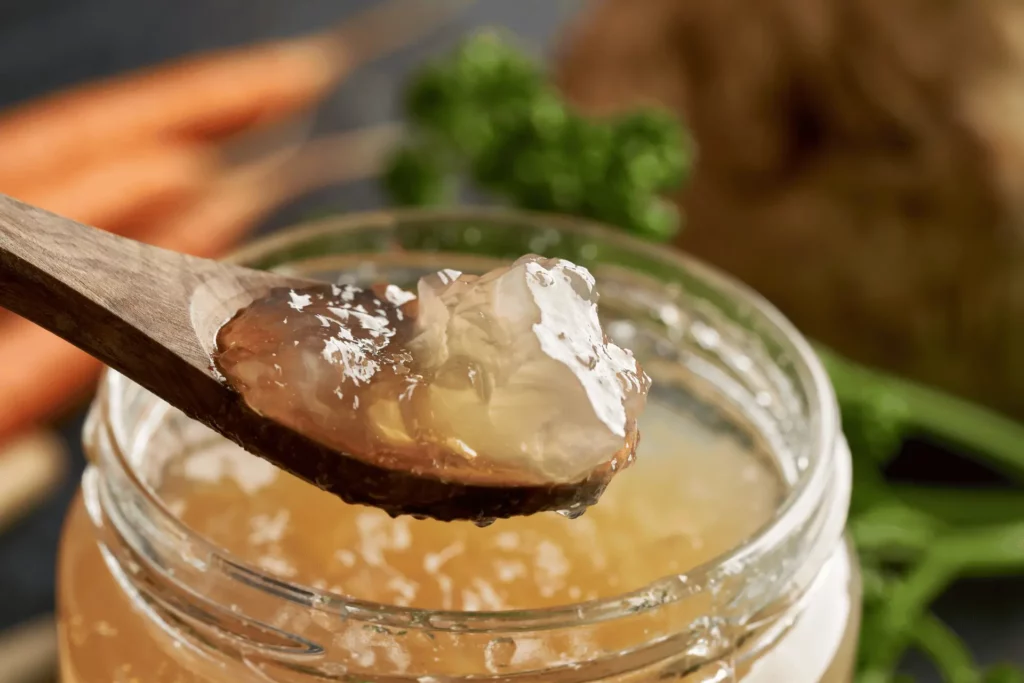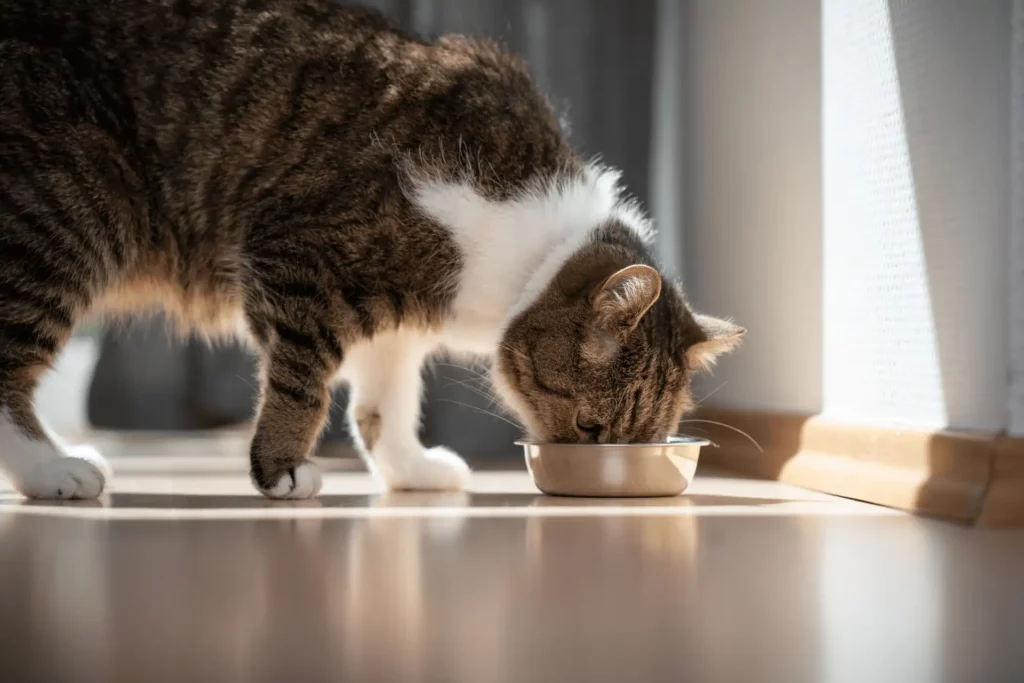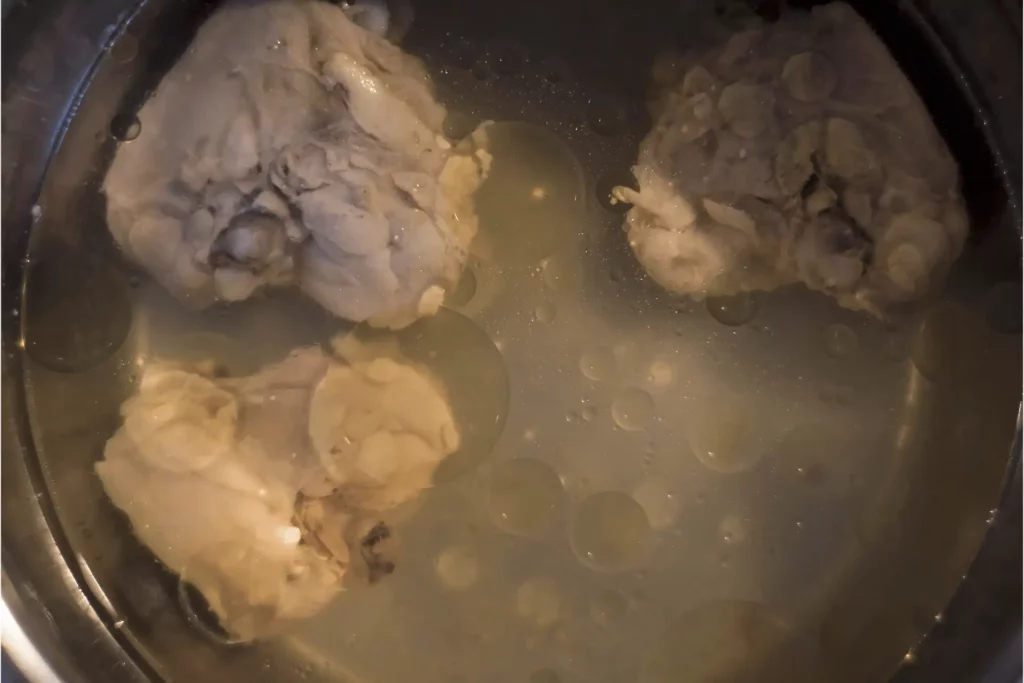
“Is bone broth good for cats?” The short answer? Absolutely! Bone broth is not only rich in minerals but also aids in hydration, making it a great dietary inclusion for our furry friends.
As a cat mom, I’ve dedicated over a decade to understanding what makes our kitties purr with satisfaction when it comes to nutrition, and I’ve found bone broth to be a real winner.
In this article, we’ll explore:
- The nutritional benefits of bone broth for cats.
- How bone broth can help manage specific feline health issues.
- Tips on selecting the best bone broth and integrating it into your cat’s diet.
Understanding Bone Broth
What is Bone Broth?
Well, think of it as a nutrient-packed, flavorful soup made by simmering animal bones—usually chicken or beef—in water over a prolonged period. This slow-cooking process extracts valuable nutrients like collagen, amino acids, and minerals, all of which are highly beneficial for your cat’s health.
But not all bone broths are created equal!
Types of Bone Broth
There are two main types of bone broth you might consider for your feline friend: chicken and beef. Each offers unique benefits.
Chicken bone broth is lighter and generally easier for cats to digest. It’s also an excellent source of protein, which is vital for your cat’s energy levels and muscle health.
On the other hand, beef bone broth tends to be richer in flavor and packed with minerals like calcium and phosphorus, contributing to strong bones and teeth.
Then there’s the question of homemade vs. store-bought bone broth. I’ve tried both, and while the convenience of a ready-made broth is tempting, nothing beats the satisfaction of preparing a homemade batch. Plus, when you make it yourself, you know exactly what’s going into your cat’s bowl.
General Health Benefits of Bone Broth for Cats
Bone broth isn’t just a tasty treat for our whiskered friends. It’s a veritable cocktail of health benefits.
Hydration:
We all know how cats can be a bit snobbish about drinking water. Bone broth, with its palatable taste, can be a lifesaver for those furballs who aren’t fans of plain water. It’s a delicious means to ensure they get their necessary fluids, keeping their bodies hydrated and functioning optimally.
Joint Support:
Bone broth contains glucosamine and chondroitin, compounds known for their joint health benefits. These substances help maintain your cat’s mobility, ensuring they can continue their high jumps and swift dashes across the living room.
Digestive Aid:
Good health starts in the gut, and bone broth can play a vital role here. The gelatin it contains is known to strengthen the gut lining, promoting healthy digestion. This means fewer hairballs and a happier cat.
Immune System Boost:
Bone broth is also rich in amino acids like arginine, glutamine, and cysteine. These compounds have been shown to boost immune health, helping your furry friend fend off various illnesses.
Appetite Stimulation:
Bone broth can be a game-changer for cats that have lost their appetite, perhaps due to illness or old age. It’s flavorful and enticing, encouraging them to eat and ensuring they’re getting the nutrition they need.

Allergy Relief:
Research indicates that bone broth can help alleviate food sensitivities. Its natural, wholesome ingredients are less likely to trigger an allergic reaction compared to some commercial pet foods.
Skin and Coat Health:
Packed with collagen and amino acids, bone broth can contribute to a shiny coat and healthy skin. These essential nutrients help to maintain the elasticity and health of the skin, while also promoting a glossy, vibrant coat.
Recovery Aid:
It’s easily digestible, making it a perfect choice for cats with sensitive stomachs or those recovering from illness or surgery. Its high nutrient content can assist in the recovery process, providing your cat with the energy they need to heal.
Buying the Right Bone Broth for Your Cat
When choosing a bone broth for your fur baby, you’d want to ensure it’s both tasty and nutritious, wouldn’t you? Now, the first thing to look at is the ingredient list. Quality bone broth will typically contain bones from beef, chicken, turkey, or fish. You’ll also often find vegetables like carrots, celery, or parsley.
It’s crucial to avoid bone broths containing ingredients harmful to cats, such as onions, garlic, and certain spices. Also, always opt for broths that are free from artificial preservatives and additives.
Now, you might be wondering – “Laura, any recommended brands?” Absolutely! Brands like “Fancy Feast Classic Broths with Wild Salmon” and “Friskies Lil’ Soups with Tuna in a Velvety Chicken Broth” offer organic, cat-friendly bone broths with lots of good reviews from cat parents.
DIY: Preparing Bone Broth for Cats
If you’re like me and enjoy the occasional DIY project, making bone broth at home can be a fulfilling experience. Not to mention, it allows you to control exactly what goes into your cat’s food.
When making bone broth, you can use a variety of bones, such as beef marrow bones, chicken necks, or fish heads. You can also include cat-friendly veggies such as carrots or celery.
Recipe 1: Simple Chicken Bone Broth
Here’s a simple, cat-friendly recipe to get you started.
Ingredients:
- 1-2 pounds of chicken bones (necks, backs, wings, or legs)
- 6-8 cups of water
- Optional: Cat-safe vegetables like carrots and celery

Instructions:
- Place the chicken bones in a large stockpot.
- Add optional roughly chopped cat-safe vegetables.
- Add enough water to cover the bones and vegetables.
- Let simmer for at least 6 – 8 hours, periodically skimming off any foam that forms on the surface.
Voila! You’ve just made your first batch of bone broth.
Recipe 2: Beef Bone Broth
Ingredients:
- Marrow bones or soup bones
- 1-2 tablespoons of apple cider vinegar
- Water to cover
Instructions:
- Roast the bones in a 400-degree oven for 45 minutes.
- Place the roasted bones in a slow cooker.
- Fill with water to cover the bones.
- Add apple cider vinegar.
- Cook on low for 12-24 hours.
- After cooling, strain the broth and store it in the refrigerator or freeze it for later use.
Sometimes, when the broth cools, it turns into a jelly-like substance. That’s a good sign! It means your broth is rich in collagen, a protein beneficial for your cat’s joint health.
H3: When Bone Broth May Not Be Suitable
While bone broth is generally beneficial, there are specific circumstances and health conditions that require caution.
A classic example of this is cats diagnosed with kidney disease. These furry friends should stick to a low-protein diet, as excess protein could potentially exacerbate their condition. According to a study published in the Journal of Feline Medicine and Surgery, reducing protein intake in cats with kidney disease can significantly slow the condition’s progression.
If your cat has specific allergies, it may react negatively to some ingredients found in bone broth, such as chicken or beef. Cat allergies can manifest as skin irritations, gastrointestinal upset, or respiratory issues and are often caused by proteins in their food. Therefore, it’s crucial to be aware of what goes into your cat’s bowl, even when it’s something seemingly harmless like bone broth.
If your cat has had bouts of pancreatitis in the past, you’ll want to be extra careful about what kind of broth you feed them. Some broths, although delicious, might contain high levels of fat that could spark a pancreatitis flare-up. Today’s Veterinary Practice published an article emphasizing how a diet high in fat can be a potential trigger for worsening pancreatitis.

How can you tell if bone broth isn’t sitting well with your kitty? Look out for signs like vomiting, diarrhea, lethargy, or loss of appetite following the introduction of bone broth to their diet. These symptoms might indicate an allergic reaction or a sensitivity to the ingredients used in the broth.
Before introducing bone broth into your fur-baby’s diet, have a chat with your veterinarian. Based on your cat’s specific health status, they can provide valuable insight into whether this addition will be beneficial or detrimental.
Conclusion
In the end, as a cat parent, your primary goal is to ensure your furry friend is happy and healthy. And with this little guide, you’re well on your way to doing just that. Bone broth can be a fantastic addition to your cat’s diet. It’s a nutrient-rich, tasty treat that offers a host of health benefits. So why not give it a try and see if your cat becomes a fan of this superfood?
Frequently Asked Questions
Can I give my cat bone broth every day?
Yes, you can, but moderation is key. Bone broth should supplement, not replace, a balanced diet for your cat.
Can bone broth replace a balanced diet for my cat?
No, bone broth should not replace a balanced diet. It can be a nutritious supplement, but it doesn’t contain all the essential nutrients your cat needs.
What ingredients should I avoid in bone broth for cats?
Avoid using onions, garlic, and other ingredients that can be harmful to cats. Also, avoid adding salt or other seasonings that could be potentially harmful in large quantities.
How do I introduce bone broth into my cat’s diet?
Start slowly. Introduce a small amount first and gradually increase it based on your vet’s recommendations.
Is bone broth too salty for cats?
With cats, salt isn’t necessarily their best friend. While store-bought bone broths might be convenient for us, they often contain higher salt levels, which can be harmful to cats. Always opt for low-sodium versions or, better yet, make your own bone broth at home. This way, you can control what goes into it, ensuring it’s both delicious and safe for your furry friend.
How much bone broth should I give my cat?
The amount of bone broth you give your cat can depend on its size, age, and overall health. As a general guideline, you should give your cat about 1-2 tablespoons of bone broth per day in the beginning. Once they get used to it, anywhere from ¼ to ½ cups per day is okay. But always consult with your vet before making any significant changes to your cat’s diet.
